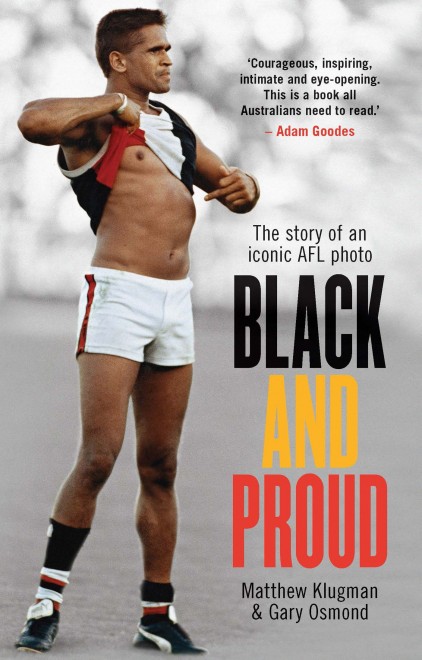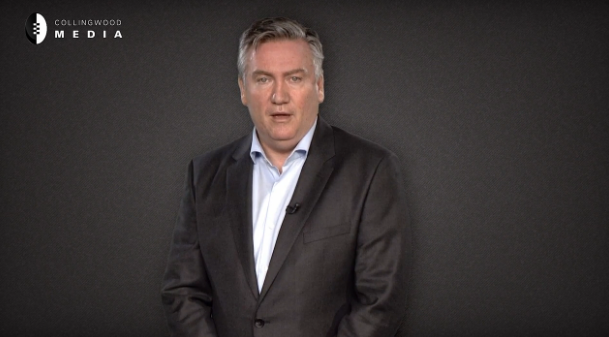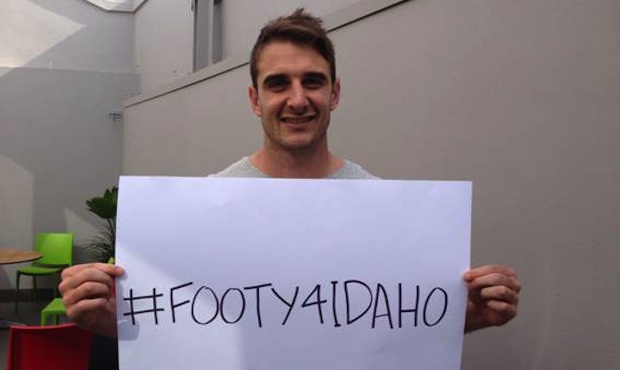Eddie McGuire, Sam Newman And The AFL’s Missed Opportunity To Affect Real Change
Have the AFL dropped the ball?

On a freezing afternoon in the depths of a harsh Melbourne winter, St Kilda forward Nicky Winmar stands defiantly at the centre of Victoria Park. Holding up a striped footy guernsey to expose his torso to a leering Collingwood cheer squad, he stares down his opposition and declares: “I’m black – and I’m proud to be black!”
This powerful image was plastered on the front page of The Age the next day, followed by an almost unanimous decrying of the racial vilification of indigenous football players; a shameful and previously unacknowledged aspect of the game in 1993. The AFL followed suit two years later. Spurred on by an on-field incident between Essendon’s Michael Long and Collingwood’s Damian Monkhorst, they would enact Rule 30, the first ever Australian sporting law prohibiting racial vilification.

Over two decades on from this watershed moment in Australia’s sporting history the effects of Winmar’s actions are still being felt. From this one act of defiance an entire culture would begin to shift. And while the conversation surrounding the racially motivated booing of former Sydney Swans star Adam Goodes is evidence that we still have a long way to go when it comes to race relations in this country, the response from football officials to these incidents highlights just how much power the AFL has to act an agent of social change in Australia.
–
But Can The AFL Really Affect Societal Change?
The potential for the AFL to use its power to help shift social and cultural perceptions became glaringly obvious again last week following the furore surrounding Eddie McGuire. During a broadcast of the Big Freeze charity match at the MCG, the Collingwood President joked with his Triple M co-hosts – including North Melbourne President James Brayshaw and All-Australian selector Danny Frawley – about drowning respected football journalist Caroline Wilson. While the decades long bigotry faced by so many of the game’s Indigenous players is incomparable to the comments made about Wilson, the events of the last fortnight do reinforce how big a role Australia’s number one sporting code can play in affecting real change in the community. And it also highlights how big the chasm really is between the older, powerful football elite and the current and future generation of players and fans.
It took Eddie McGuire three attempts at apologising to Caroline Wilson to get it right, his final mea culpa ultimately acknowledging the gravity of his “banter”. While AFL CEO Gillon McLachlan chastised McGuire and co for their comments and reiterated the league’s commitment to being leaders in assisting changing attitudes towards women that lead to violence, he also accepted McGuire’s rather lacklustre first apology and refused to enact any form of punishment.

Master apologist Eddie McGuire.
And after a week of staying uncharacteristically shtum about the incident, longtime Footy Show panellist Sam Newman last week spoke out in defence of McGuire, his former colleague and close friend. Describing Wilson as an “embarrassment”, Newman told Channel Nine viewers: “If you’re going to want to be treated equally, the point is, don’t complain when it’s too equal. The jig’s up Caro,” he said. “Honestly and truly … And even if you were underwater, you’d still be talking.”
As predictably vile as Newman’s comments were they came off like the rantings of an old man desperately trying to stay relevant. Classily put in place by co-host Rebecca Maddern, Newman may as well have been standing on his front lawn shaking his first at a cloud.
Compare this then to the response of senior players of the Richmond Football Club who, after hearing about the Wilson incident, chose to boycott Triple M over the weekend. Speaking with Fox Footy’s 360 program, star forward Jack Riewoldt revealed that the playing group had engaged in a conversation about what happened and decided it wasn’t on. “I think you’ve just got to put yourself in her [Caro’s] shoes and it was pretty much a no brainer for us,” Riewoldt said. “I am so proud of my football club to be able to do this and be a face of change…” This is AFL football in 2016 and such decisive leadership can do more to change attitudes towards women than a few forced apologies (or 100 think pieces rallying against Eddie McGuire) could ever achieve.
Wonderful portrait of Eddie McGuire from the great man, @JamesFosdike #afl #AFLPiesFreo pic.twitter.com/2Sa67ZNWJ2
— Declan Fay (@declanf) June 24, 2016
–
AFL Players: The ‘Real’ Agents Of Change
Players are increasingly showing a social conscious and awareness for important issues outside of the game. Last year Richmond defender Alex Rance reported a homophobic slur from the opposition cheer squad to MCG security. After sharing his own experience of domestic violence as a child, Geelong footballer Jimmy Bartel has helped launch a campaign to help provide support for families in similar situations. And in 2015 players for the St Kilda Football Club successfully lobbied the AFL to add a gay pride game to the 2016 fixture after the group were moved by the story of Jason Ball – the first openly gay football player at any level of the game.

Essendon’s Jobe Watson … one of several AFL players supporting the International Day against Homophobia.
In addition to the shifting attitudes of players the AFL has one of the most diverse fanbases of any sporting code in Australia – with an almost 50/50 gender split, LGBTI support groups and deep roots in many of Melbourne’s different ethnic communities. Never has there been a sport in this country so primed to play an active role in helping engender serious social change.
Gillon McLachlan has made it clear he wants the AFL to support important causes, and he should be commended for his efforts, which include launching the first AFL Women’s League. However, actions speak louder than words and in failing to take a stronger stance on the Wilson/McGuire incident he has missed an opportunity to instigate real change. This means pushing harder for a more diverse sporting media landscape as well, one in which the voices and faces represent more than just the men who used to play the sport.
It’s time the voices we hear talking about our game every week begin to reflect the social reality of both the new generation of players and fans. Because, the fact of the matter is, no one is listening to Sam Newman anymore.
–
Sarah Smith is a music journalist, presenter on Melbourne’s Triple R and former editor of FasterLouder. Throughout her time as a writer she has been confused by Courtney Love, charmed by Mike Patton, and tormented by Weezer. She tweets @sarah_smithie.

